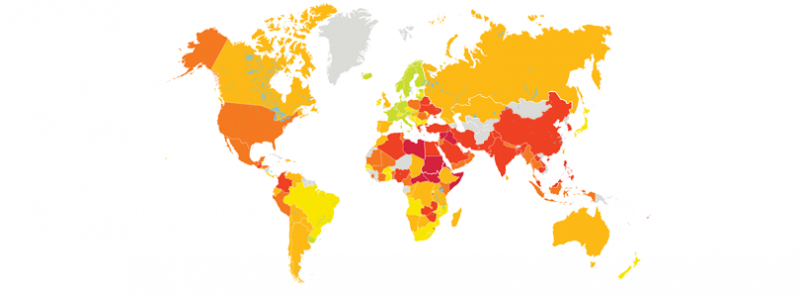The
2015 Global Rights Index, recently published by the ITUC (International Trade Union Confederation), listed China as one of the ten worst countries and regions in the world for working people, along with states in the Gulf region and North Africa that have long been notorious for trampling fundamental rights at work. The Global Rights Index was debuted in 2014 by ITUC, the world’s largest trade union confederation, and rates around 140 countries annually on a scale from 1 to 5 based on internationally recognized indicators, including dimensions of civil liberties, trade union activities, the right to establish or join unions, the right to collective bargaining, and the right to strike. In this year’s report, China scored the second lowest ranking (5), which indicates “no guarantee” of labor rights. The report explains that workplace discrimination, arrests of strikers, precarious working conditions, and lack of legal due process remain key problems.
 Map colored by level of rights for workers. (Green is most highly rated, while dark red is most lowly rate.)
Map colored by level of rights for workers. (Green is most highly rated, while dark red is most lowly rate.)
The report pointed out that strikers in China are often treated as saboteurs of public order and security, facing wide-scale physical attacks and threats from both employers and government officials. In the case of the First Hospital of Guangzhou University of Chinese Medicine in 2013 and 2014, security guards at the hospital who were dismissed without prior notice, went on strike and clashed with the police. Twelve strike organizers were arrested and detained, while nine of them were criminalized in the end. The ITUC said that the absence of explicit recognition of the right to strike and lack of due process in China’s legal system explains the systematic failure in ensuring Chinese workers’ collective rights.
In ITUC’s previous reports on China, government restrictions on collective bargaining and independent unionization stood as the key issues creating wage inequality and limiting the improvement of working conditions. The growing number of labor protests and strikes in the recent years is a signal of these problems, together with a series of others, including institutional discrimination against migrant workers, forced and child labor, dysfunctional dispute settlement mechanism, all of which the government is urged to address.
The ITUC was established out of the merger of the prior ICFTU (International Confederation of Free Trade Unions) and WCL (World Confederation of Labour) in 2006 and plays a leading role in documenting and exposing violations of labor rights around the world. Notably, China is one of the few countries or regions that is not affiliated with ITUC.